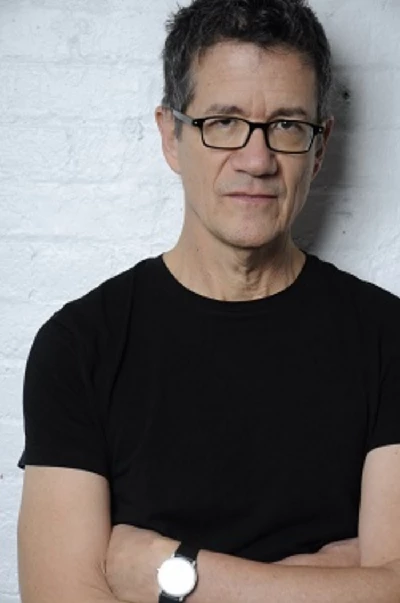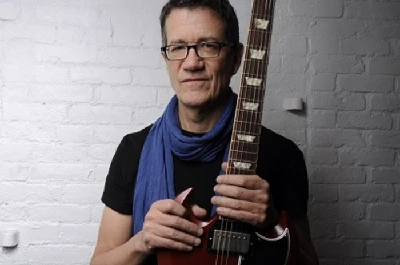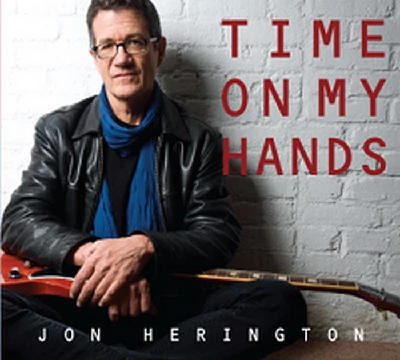published: 9 /
7 /
2014

..while in the second part he speaks about his recent record, 'Time On My Hands'
Article
PB: Let’s concentrate on your new album. You’ve worked with bassist Dennis Espantman and drummer Frank Pagano on several other albums, so what makes this one unique?
JH: ‘Time On My Hands’ was done with a completely different intention than all the records before it because I wanted for the first time to make sure that I got a certain kind of guitar playing into the spotlight and into the centre and made it the centre of the record, but I wanted to do it in a way that didn’t compromise the quality of the song itself because we’ve always been sort of fussy about that.
The couple of records of songs before that were more in a singer-songwriter style. They were more about the songs than the guitar playing, so I wanted to honour that habit and tradition for us. And I wanted to make sure that I got some kind of document of my playing. It’s actually the kind of playing I had developed over the years on the Steely Dan gig. I had been doing that since 2000, and it’s such an amazing opportunity to get to play the same music with the same players night after night to expectant houses.
Before I had that repeat experience with Steely Dan, I didn’t understand how certain players were able to achieve certain things, but once I had done that for three or four years it was like a light bulb above my head going on. That’s how you do it. If you bring the right attitude of what can I do, I managed to do the job last time and I did this with it – I would ask myself, “What can I do to it again? How can I add to what I’ve done?” I would challenge myself further to grow in this role because there’s so much room to play in Steely Dan.
They don’t tell me what to play. There are so many guitar solos. It’s such a huge and beautiful opportunity. So, over the years because I worked on it and took it seriously, I tried to find a way to both honour what I loved about the records but also to make it known and find a way to develop my own voice. And I realised I had done enough of that, so I had this desire to put it on a record of my own and to make sure that that kind of playing got on a record of my own because it hadn’t gotten on my records as much.
The big difference is how Steely Dan designs their songs. So often, they somehow write in a big open section for a soloist and it’s usually different music from the regular part. It’s often an entirely separately composed section, but somehow it doesn’t compromise the song; it just enhances it and this was never a habit of mine as a songwriter because I grew up imprinted by the Beatles and the Beach Boys songs. I became a fan of the Stones and the British Invasion stuff but, really, I think my most natural songwriting expression is in forms that are much simpler and less extended and almost more country, in route, like a lot of the early Beatles and Chuck Berry stuff. It’s very simple and straightforward and the guitar solos usually last like a little melodic eight bars from the vocal and then back and Steely Dan doesn’t do that. Look at a tune like ‘Aja’. It’s kind of an epic thing and it’s wild. It’s so different.
It was never a natural way to write but I decided for ‘Time On My Hands’ that I would approach it from the guitar point of view and compose sections that would feature the guitar before I would compose the entire song, which was very, very different for me.
So my concern was, if I’m writing for the guitar is this going to sound self-indulgent? Are the songs going to sound not as important? So, we worked very hard to make sure that the songs held up for us as songs ,and that they were able to present the guitar in this way with longer solos and that I got to play a certain way.
I realised I did have to shift gears, as a writer and especially as a lyricist because it turned out that in order to have room for all that guitar playing, the song style and form had to move a little closer to the blues world than it ever had before, and that allowed me to do several choruses of guitar playing and that was pretty natural, but when I tried to write in the same way that I had on earlier records there was a quality of lyrics on a lot of the attempts that I made that just seemed too earnest. The music that we were making seemed to require a lighter hearted attitude, so it led me to collaborate with a couple of guys.
PB: One being Jim Farmer, who has written some of the lyrics for ‘Time on My Hands’?
JH: Yes, Jim Farmer and Dennis Espantman on bass. And since that last record Dennis and I have written another twelve songs for a record that is going to be more light-hearted and quite fun as well. But ‘Time On My Hands’ was really the first time that we were able to solve that problem. How do I present myself as the guitar player and also make sure that the songwriting measures up for us as much as it can? I’m happy with the way it turned out. It was a fun record to make. I do feel like it satisfied me as far as documenting that type of guitar playing. I don’t feel like I have to do that again, which is big, because I would have regretted it if I had never gotten it on record.
PB: How did you go about collaborating with Dennis and Jim?
JH: Typically what works for Dennis and me - and even when Jim is involved is -I would often have quite a lot of the music written and sometimes a title as well, but not always. Dennis and I work pretty much from a title but we sometimes have to really be patient to get a good one (Laughs).
I can’t just come up with one after the next. But when we feel like we have an idea for what a song may be abou, we might not even have a title, but Dennis is a great general idea guy. He will find inspiration from some article he’s read or some friend’s dilemma. So, he’ll sometimes have an idea and I’ll sometimes have some music.
We’re lucky because I’ve known him so well after all these years. I’ve never been really comfortable co-writing, and every time I try to do it with people I don’t know too well I just feel awkward and kind of powerless in the same room at the same time with them. I guess I feel like we ought to be getting results. There ought to be obvious progress and, if there’s not, it’s uncomfortable and I feel like there’s tension in the room.
With Dennis, we can sit there for forty-five minutes and not say a word because we both have a pad on our laps and we’re just thinking. We’re just working independently, but there’s this trust that at some point we’re going to confer again and we don’t mind just sitting there because he’s an easy guy to be with. He’s a friend and we trust each other.
But also we can spend a day and get very little done, and then he’ll be riding the subway home or I will be and something will strike me or him, and then we’ll email each other. We’ll improve and edit as we go. It’s almost like we just need to light the spark somehow and there’s a shared sense of excitement. It’s like a puzzle we’re figuring out.
PB: It definitely sounds like the process requires some space.
JH: It’s been fun, so I’m a converted collaborator. I didn’t used to be. I’m still pretty fussy about the music and that comes easier to me, so I can quickly come up with options that way. If that’s not working, we can do it this way. That’s been more my focus my whole life. I love the lyric writing, but it’s never been something that has been as easy, so that’s the stuff we have to be patient about. But when we have an idea that we think is going to hold up we go for it, and it has an infectious quality that we can’t put it down.
PB: ‘I’ll Fix Your Wagon’ had some fun American name checks such as :“amber waves of grain,” and even the clunky description of the wagon itself is very American.
JH: (Laughs). That’s Jim Farmer. That’s almost entirely his lyric and a few of mine. It’s all my music and his lyric. It’s evocative. It’s not narratively clear so much, but he’s got an amazing imagination and he trusts his instincts a lot where if I were writing something, I’d be fussy or narratively clear. It’s just my nature. I’m a better editor than I am a creative writer, I’m sure. But Jim is just born for that dreamy associative type of thing. He’s an amazingly wild playwright, so words are fun and he has no fear so it’s always a pleasure to work with him.
I didn’t realise this until the tune was done, but the first day I went out to buy LP records as a kid –I usually bought singles – I must have been saving my allowance because I was able to buy Jimi Hendrix’s ‘Are You Experienced?’ Cream’s ‘Disraeli Gears’ and the Beatles’ ‘White Album’ on one shopping trip. I came home stocked and it wasn’t until quite a bit after that track was done I realised there’s something about that track – it has elements of each of those three artists and it was not conscious, but if you remember the Hendrix track, ‘Manic Depression,’ it’s in three, like ‘I’ll Fix Your Wagon’and there’s something about the groove that’s totally like ‘Manic Depression’ but there’s something about the guitar part and the sound voicings that it’s almost a little twisted remake of ‘Crossroads’, the Clapton solo.
And there’s something about the treatment of the entire track, the backwards guitar and I was trying to imitate a string section with the slide I added to that track. It reminded me of a track on one of John Lennon’s records, ‘How Do You Sleep?’, but it has these beautiful strings up in fourths on top. It had this wild, eerie character but the whole sort of way the record is produced it’s almost a tribute to late Beatles’ record production: ‘Sgt. Pepper’ or ‘The White Album, so somehow that track sums up my first record buying experience and has elements of all those bands that are obvious to me now but that I wouldn’t have recognised when we were writing and recording.
PB: I hear the Byrds and the Hollies in ‘Running out of Time’.
JH: I kind of hear the Everly Brothers and Simon and Garfunkel. That connects to all those groups.
PB: ‘Sweet Ginnie Rose’ is like partying with Ravi Shankar and Bo Diddley.
JH: It’s like a Bo Diddley raga. (Laughs). That kind of traces back to some Steely Dan thing, too. I remember struggling with trying to find a way to make a solo in the classic song ‘Peg’ (first released on Steely Dan’s 1977 ‘Aja’ - LT)’ and I remember the way Jay Graden had played on it. There are a couple things he does which take advantage of open strings on the guitar and I said,”That’s kind of an interesting thing. I’m going to explore that whole concept of how can I use open strings to get that kind of character out but not playing the same thing he played. I was looking for a way to reference what I loved about it but to find a way to be more personal and open ended with it too.
It led me to this exploration of what can I do with open strings with this particular technique that I really got with Jay’s solo on that record, and it led to that opening line that sounds like a sitar-guitar on the beginning of the record but then the electric takes over. It’s exactly from all that work when I was trying to play better on ‘Peg’.
PB: On your website, your fans ask sophisticated questions about gear, tone and technique. The dialogues back and forth are very illuminatingm but there’s a lot of information to take in and just mastering one’s instrument is very time consuming. When should a musician focus on these other aspects of performance?
JH: That’s an interesting question. There’re all really just tools for expression. It can get pretty nerdy and pretty complicated and pretty subtle, but I think anybody’s interest that way should always be directed by the music first.
The only reason it makes sense that all of that stuff exists is to sort of allow you to get clearer about what you’re trying to do. For instance, if there’s a guy who is playing acoustic guitar and all he ever does is play his acoustic guitar and he has a beautiful instrument he needs to know about strings and picks if he uses them. He may want to hunt for the right guitar.
After that, if he’s going to record, he can worry about what microphone to put on it, but that could be the recording engineer’s job but it can stop right there if that’s all he needs.
But if you’re playing electric guitar there are a number of additional choices. There are more things to decide and there are so many ways to doctor up the sound of a guitar and people are inventing new ones all the time, so it’s easy to get lost in that. But some people are really interested and find that the new gear will stimulate them creatively.
Adrian Belew (formerly of King Crimson -LT) was always that way and he’s the master of making the wacky sounds that you can get out of all sorts of gear.
It’s a beautiful world out there but, basically, if you want to play like a saxophonist plays where you just want a nice sounding tone, then you want it to be natural then all that gear can be a serious distraction, and you probably only want to worry about it to the degree that it can help you create this natural sound where you can pick the instrument and be comfortable immediately and think about the music.
Although I have certainly paid attention to all the gear stuff, I’m not thinking about it at all because all those choices have been made and after they’ve all been made I can concentrate on the music, which is what I really want to do.
PB: What’s something you’re looking forward to this summer that is not musical?
JH: I’m about to spring for the first truly good camera that I’ve ever owned and I’m not sure why I waited this long, but I’m still a little scared about it, because even in the past when I’ve had a decent camera and taken it on the road, I’ve run the risk of getting to into it I remember thinking I wouldn’t be seeing anything that wasn’t behind the viewfinder. I wasn’t really able to be there. I was so concerned about the picture taking and I’m a little concerned that that may happen again, but I think I’m going to take the plunge.
I love music and I’ve really been so lucky with my playing opportunities ,but it really does take up a lot of my time and energy and I’m okay with that but I do feel like it would be fun to have something else going on and I guess there’s room for it.
I’m also going to be doing a couple more musical projects on the road with the band as well. I’m going to put together in print form a collection of arrangements for jazz guitar standards. I used to do that all the time when I was serious about jazz study and I really haven’t put them all together.
And I’m going to be doing some more editing on the record that we’ve done, but there’s still more to do but I can edit on my laptop and then I’ll be ready to come home after the tour and record vocals and a few more guitar solos, and then I’m ready to finish the next record by the end of the year. There’s plenty going on.
PB: Thank you.
Picture Gallery:-

